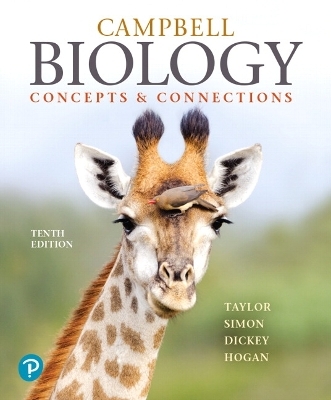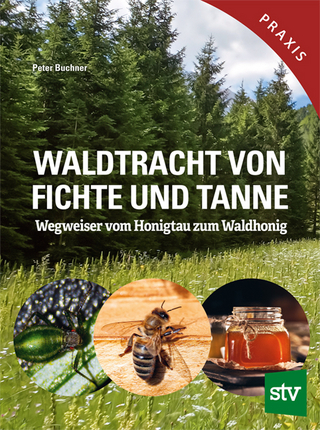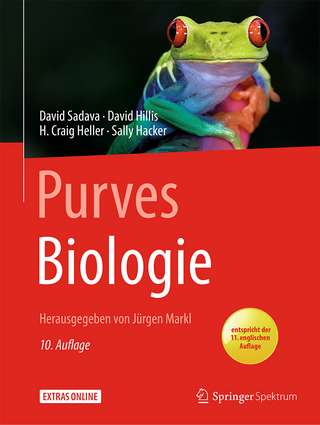
Campbell Biology
Pearson (Verlag)
978-0-13-526916-9 (ISBN)
- Titel ist leider vergriffen;
keine Neuauflage - Artikel merken
For non-majors or mixed biology courses.
An innovative learning experience that addresses how students learn today
Campbell Biology: Concepts & Connections continues to introduce pedagogical developments that create an innovative learning experience and motivate students not only to learn, but also interact with biology. The hallmark modular organization built around central concepts helps students stay focused while engaging them in connecting biology with the world outside the classroom.
Building on the text’s outstanding art and hallmark features, the 10th Edition delivers new digital resources and embedded interactives that guide students to success in the course. This edition draws from learning science as well as the authors’ classroom experience to provide tools that address how students learn today. New Chapter Openers help students retain information, selected features break content into bite-size subsections, and additional author-created videos ensure students focus on what is important.
Now available with Modified Mastering Biology
By combining trusted author content with digital tools and a flexible platform, Mastering personalizes the learning experience and improves results for each student. Mastering Biology extends learning and provides students with a platform to practice, learn, and apply knowledge outside of the classroom.
0135269164 / 9780135269169 CAMPBELL BIOLOGY: CONCEPTS & CONNECTIONS [RENTAL EDITION], 10/e
About our authors Martha R. Taylor has been teaching biology for more than 35 years. She earned her B.A. in biology from Gettysburg College and her M.S. and Ph.D. in science education from Cornell University. At Cornell, Dr. Taylor has served as assistant director of the Office of Instructional Support and has taught introductory biology for both majors and nonmajors. Most recently, she was a lecturer in the Learning Strategies Center, teaching supplemental biology courses. Her experience working with students in classrooms, in laboratories, and with tutorials has increased her commitment to helping students create their own knowledge of and appreciation for biology. She was the author of the Student Study Guide for ten editions of Campbell Biology. Eric J. Simon is a professor in the Department of Biology and Health Science at New England College in Henniker, New Hampshire. He teaches introductory biology to science majors and nonscience majors, as well as upper-level courses in tropical marine biology and careers in science. Dr. Simon received a B.A. in biology and computer science and an M.A. in biology from Wesleyan University, and a Ph.D. in biochemistry from Harvard University. His research focuses on innovative ways to use technology to improve teaching and learning in the science classroom. Dr. Simon also leads numerous international student field research trips and is a Scientific Advisor to the Elephant Conservation Center in Sayaboury, Laos. Dr. Simon is the lead author of the introductory nonmajors biology textbooks Campbell Essential Biology, Seventh Edition, and Campbell Essential Biology with Physiology, Sixth Edition, and the author of the introductory biology textbook Biology: The Core, Third Edition. Jean L. Dickey is Professor Emerita of Biological Sciences at Clemson University (Clemson, South Carolina). After receiving her B.S. in biology from Kent State University, she went on to earn a Ph.D. in ecology and evolution from Purdue University. In 1984, Dr. Dickey joined the faculty at Clemson, where she devoted her career to teaching biology to nonscience majors in a variety of courses. In addition to creating content-based instructional materials, she developed many activities to engage lecture and laboratory students in discussion, critical thinking, and writing, and implemented an investigative laboratory curriculum in general biology. Dr. Dickey is author of Laboratory Investigations for Biology, Second Edition, and coauthor of Campbell Essential Biology, Seventh Edition, and Campbell Essential Biology with Physiology, Sixth Edition. Kelly Hogan is a faculty member in the Department of Biology at the University of North Carolina at Chapel Hill, teaching introductory biology and genetics. Dr. Hogan teaches hundreds of students at a time, using active-learning methods that incorporate educational technologies both inside and outside of the classroom. She received her B.S. in biology at the College of New Jersey and her Ph.D. in pathology at the University of North Carolina, Chapel Hill. Her research interests focus on how large classes can be more inclusive through evidence-based teaching methods and technology. As the Director of Instructional Innovation at UNC, she encourages experienced faculty to take advantage of new professional development opportunities and inspires the next generation of innovative faculty. Dr. Hogan is the author of Stem Cells and Cloning, Second Edition, and co-author on Campbell Essential Biology with Physiology, Sixth Edition. Neil A. Campbell (1946-2004) combined the inquiring nature of a research scientist with the soul of a caring teacher. Over his 30 years of teaching introductory biology to both science majors and nonscience majors, many thousands of students had the opportunity to learn from him and be stimulated by his enthusiasm for the study of life. While he is greatly missed by his many friends in the biology community, his coauthors remain inspired by his visionary dedication to education and are committed to searching for ever better ways to engage students in the wonders of biology.
UNIT I: THE LIFE OF THE CELL
Biology: The Scientific Study of Life
The Chemical Basis of Life
The Molecules of Cells
A Tour of the Cell
The Working Cell
How Cells Harvest Chemical Energy
Photosynthesis: Using Light to Make Food
UNIT II: CELLULAR REPRODUCTION AND GENETICS
The Cellular Basis of Reproduction and Inheritance
Patterns of Inheritance
Molecular Biology of the Gene
How Genes Are Controlled
DNA Technology and Genomics
UNIT III: CONCEPTS OF EVOLUTION
How Populations Evolve
The Origin of Species
Tracing Evolutionary History
UNIT IV: THE EVOLUTION OF BIOLOGICAL DIVERSITY
Microbial Life: Prokaryotes and Protists
The Evolution of Plant and Fungal Diversity
The Evolution of Invertebrate Diversity
The Evolution of Vertebrate Diversity
UNIT V: ANIMALS: FORM AND FUNCTION
Unifying Concepts of Animal Structure and Function
Nutrition and Digestion
Gas Exchange
Circulation
The Immune System
Control of Body Temperature and Water Balance
Hormones and the Endocrine System
Reproduction and Embryonic Development
Nervous Systems
The Senses
How Animals Move
UNIT VI: PLANTS: FORM AND FUNCTION
Plant Structure, Growth, and Reproduction
Plant Nutrition and Transport
Control Systems in Plants
UNIT VII. ECOLOGY
The Biosphere: An Introduction to Earth's Diverse Environments
Behavioral Adaptations to the Environment
Population Ecology
Communities and Ecosystems
Conservation Biology
APPENDICES
Metric Conversion Table
The Periodic Table
The Amino Acids of Proteins
Chapter Review Answers
Credits
| Erscheinungsdatum | 30.12.2019 |
|---|---|
| Sprache | englisch |
| Themenwelt | Naturwissenschaften ► Biologie |
| ISBN-10 | 0-13-526916-4 / 0135269164 |
| ISBN-13 | 978-0-13-526916-9 / 9780135269169 |
| Zustand | Neuware |
| Informationen gemäß Produktsicherheitsverordnung (GPSR) | |
| Haben Sie eine Frage zum Produkt? |
aus dem Bereich


